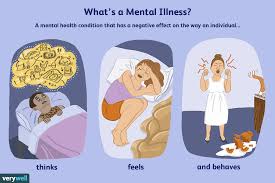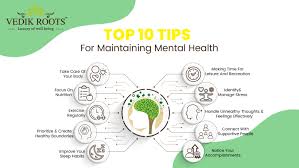In recent years, mental health awareness has gained significant traction, with increasing recognition of its crucial role in overall well-being. As we move into 2024, understanding and prioritizing mental health remains more important than ever. This comprehensive guide will explore why mental health is essential, the current trends in mental health awareness, and practical tips for maintaining and improving mental health.
1. What is Mental Health?

Mental health refers to a person’s emotional, psychological, and social well-being. It affects how individuals think, feel, and act, influencing how they handle stress, relate to others, and make decisions. Good mental health is more than just the absence of mental disorders; it encompasses a state of well-being where individuals can realize their potential, cope with normal life stresses, work productively, and contribute to their communities.
Key Components of Mental Health
- Emotional Well-being: The ability to manage and express emotions effectively.
- Psychological Resilience: The capacity to recover from stress and adversity.
- Social Functioning: The ability to form and maintain healthy relationships and participate in social activities.
2. Why Mental Health Matters
Mental health is integral to overall health and quality of life. Poor mental health can affect various aspects of life, including physical health, relationships, and productivity.
Impact on Physical Health
- Chronic Conditions: Mental health issues can exacerbate chronic physical conditions such as heart disease and diabetes.
- Immune System: Stress and mental health problems can weaken the immune system, making individuals more susceptible to illness.
Impact on Relationships
- Communication: Poor mental health can hinder effective communication and interpersonal relationships.
- Social Isolation: Individuals may withdraw from social activities, leading to feelings of loneliness and isolation.
Impact on Productivity
- Work Performance: Mental health issues can affect concentration, decision-making, and overall job performance.
- Absenteeism: Mental health problems often lead to increased absenteeism and decreased productivity.
3. Current Trends in Mental Health Awareness
As we approach 2024, several key trends are shaping the mental health landscape. Understanding these trends can help individuals and organizations better support mental health needs.
Increased Focus on Workplace Mental Health
- Employee Assistance Programs (EAPs): More companies are implementing EAPs to provide employees with access to mental health resources and counseling.
- Mental Health Policies: Organizations are developing comprehensive mental health policies and promoting work-life balance.
Telehealth and Digital Therapy
- Online Counseling: The rise of telehealth has made mental health services more accessible through online counseling and therapy.
- Mental Health Apps: There is growing popularity of apps designed to support mental well-being, offering tools for mindfulness, stress management, and mood tracking.
Integration of Mental Health Education
- Schools and Universities: Educational institutions are incorporating mental health education into curricula to raise awareness among students and staff.
- Public Campaigns: Government and non-profit organizations are running campaigns to destigmatize mental health issues and encourage help-seeking behavior.
4. Practical Tips for Maintaining Mental Health

Maintaining good mental health involves proactive strategies and practices that support emotional and psychological well-being. Here are some practical tips for individuals:
Practice Self-Care
- Regular Exercise: Physical activity can improve mood, reduce anxiety, and enhance overall mental health.
- Healthy Eating: A balanced diet with nutrients essential for brain health can positively impact mood and cognitive function.
- Adequate Sleep: Quality sleep is crucial for mental health. Aim for 7-9 hours of restful sleep each night.
Manage Stress Effectively
- Mindfulness and Meditation: Techniques such as mindfulness and meditation can help reduce stress and increase emotional resilience.
- Time Management: Effective time management can reduce feelings of overwhelm and help maintain a balanced life.
Seek Support and Build Connections
- Professional Help: Don’t hesitate to seek professional help if you’re struggling with mental health issues. Therapy and counseling can provide valuable support and strategies.
- Social Support: Building and maintaining strong relationships with family and friends can provide emotional support and reduce feelings of isolation.
5. Breaking the Stigma Around Mental Health
One of the significant barriers to mental health care is the stigma associated with mental health issues. Breaking this stigma is crucial for encouraging open conversations and seeking help.
Promoting Open Dialogue
- Education and Awareness: Educating the public about mental health can dispel myths and reduce stigma.
- Personal Stories: Sharing personal experiences with mental health challenges can help normalize these issues and encourage others to seek help.
Creating Supportive Environments
- Workplace Culture: Fostering a culture that values mental health and provides support can encourage employees to seek help when needed.
- Community Initiatives: Community programs and support groups can offer safe spaces for discussing mental health and providing mutual support.
6. Mental Health Resources and Support

Access to resources and support is essential for addressing mental health needs effectively. Here are some valuable resources:
Hotlines and Helplines
- National Suicide Prevention Lifeline: Provides 24/7 support for individuals in crisis or experiencing suicidal thoughts.
- Crisis Text Line: Offers text-based support for those in need of immediate help.
Online Resources
- Mental Health Websites: Websites such as the National Institute of Mental Health (NIMH) and Mental Health America provide information, resources, and tools for mental health support.
- Therapy Directories: Platforms like Psychology Today and BetterHelp offer directories to find licensed therapists and counselors.
Conclusion
Mental health awareness is more critical than ever in 2024, as we continue to recognize its importance for overall well-being. By understanding mental health, staying informed about current trends, and implementing practical strategies for maintaining mental health, individuals can contribute to a healthier and more supportive society. Breaking the stigma and providing access to resources ensures that everyone has the opportunity to prioritize their mental well-being and seek the support they need.

